Health and Social Care: Ethics and Values in a Day Care Setting Report
VerifiedAdded on 2023/01/18
|9
|2713
|45
Report
AI Summary
This report provides a comprehensive analysis of ethics and values within the context of health and social care, specifically focusing on a day care setting for adults with learning disabilities. It begins by defining core ethical principles such as fairness, confidentiality, respect, and effective communication, and examines their practical application. The report then explores the relevant legal and regulatory frameworks, including the Care Act 2014, Human Rights Act 1998, and Mental Health Act 1983, alongside codes of conduct, organizational policies, and safeguarding issues. The second task investigates the factors that influence personal ethics and values, using incidents such as gender-related care preferences and inappropriate staff discussions to illustrate ethical dilemmas. The final task outlines professional and legal responsibilities and boundaries, and how these can be applied to resolve ethical issues within a health care setting, emphasizing the importance of codes of conduct, health and safety protocols, and cultural competencies.
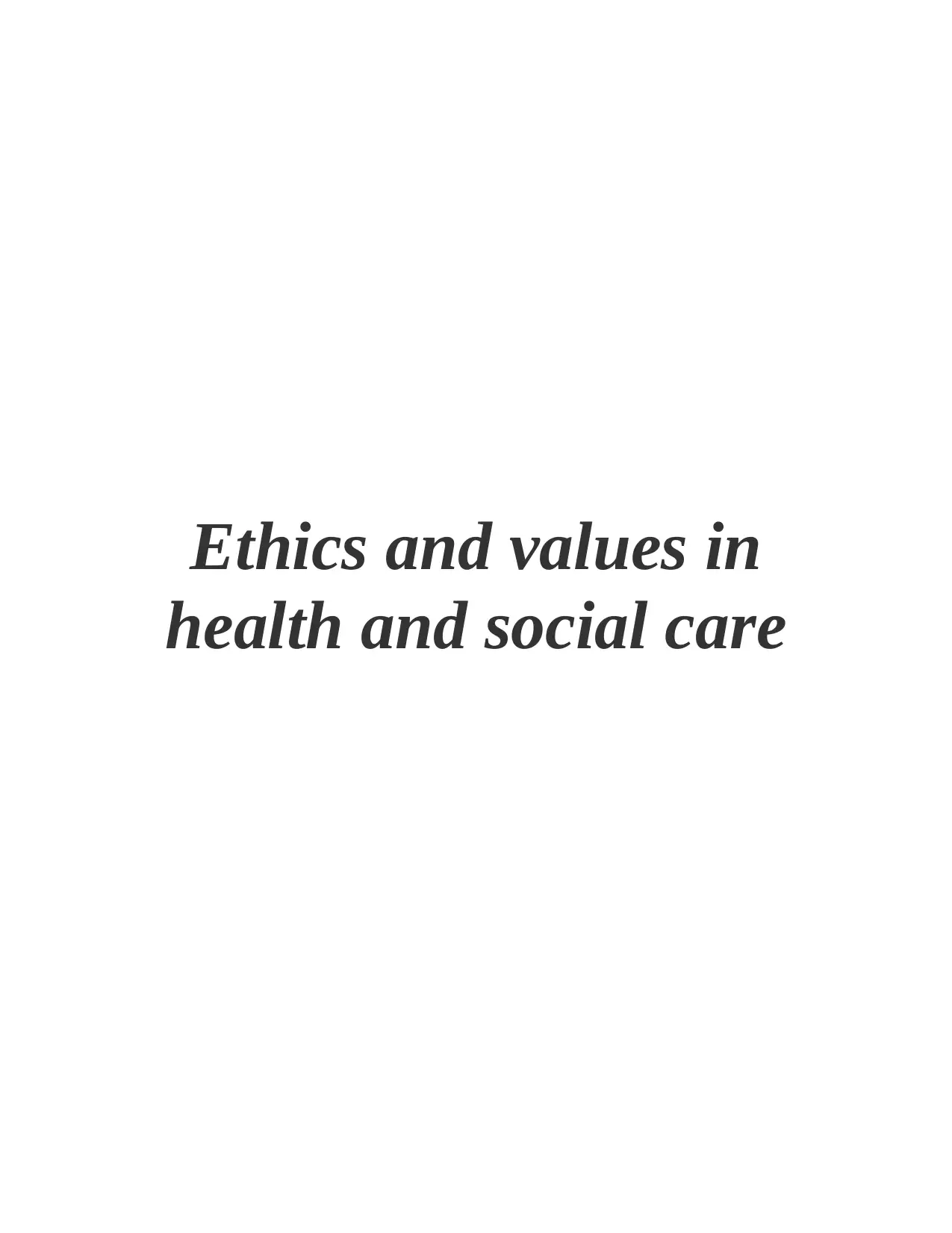
Ethics and values in
health and social care
health and social care
Paraphrase This Document
Need a fresh take? Get an instant paraphrase of this document with our AI Paraphraser
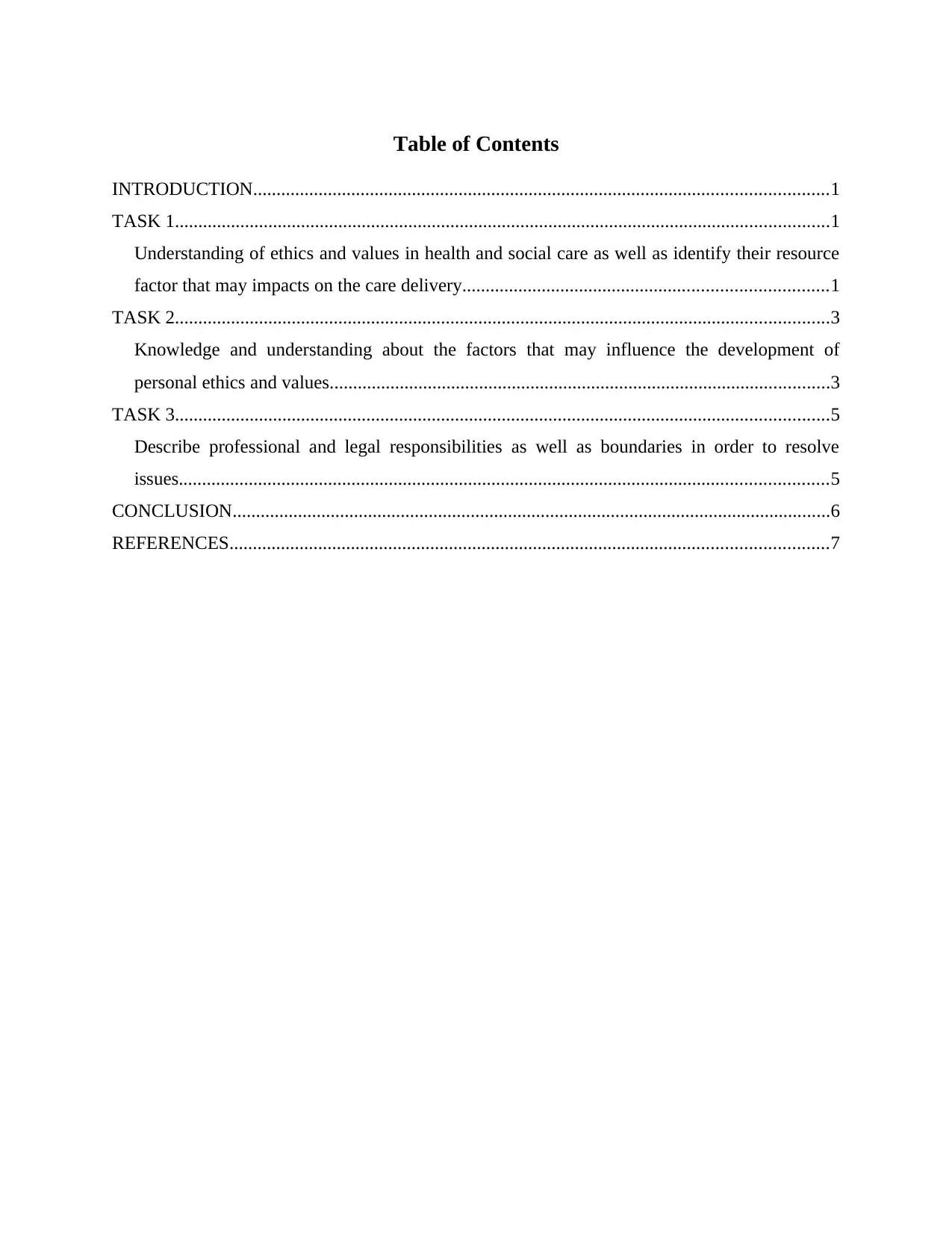
Table of Contents
INTRODUCTION...........................................................................................................................1
TASK 1............................................................................................................................................1
Understanding of ethics and values in health and social care as well as identify their resource
factor that may impacts on the care delivery..............................................................................1
TASK 2............................................................................................................................................3
Knowledge and understanding about the factors that may influence the development of
personal ethics and values...........................................................................................................3
TASK 3............................................................................................................................................5
Describe professional and legal responsibilities as well as boundaries in order to resolve
issues...........................................................................................................................................5
CONCLUSION................................................................................................................................6
REFERENCES................................................................................................................................7
INTRODUCTION...........................................................................................................................1
TASK 1............................................................................................................................................1
Understanding of ethics and values in health and social care as well as identify their resource
factor that may impacts on the care delivery..............................................................................1
TASK 2............................................................................................................................................3
Knowledge and understanding about the factors that may influence the development of
personal ethics and values...........................................................................................................3
TASK 3............................................................................................................................................5
Describe professional and legal responsibilities as well as boundaries in order to resolve
issues...........................................................................................................................................5
CONCLUSION................................................................................................................................6
REFERENCES................................................................................................................................7
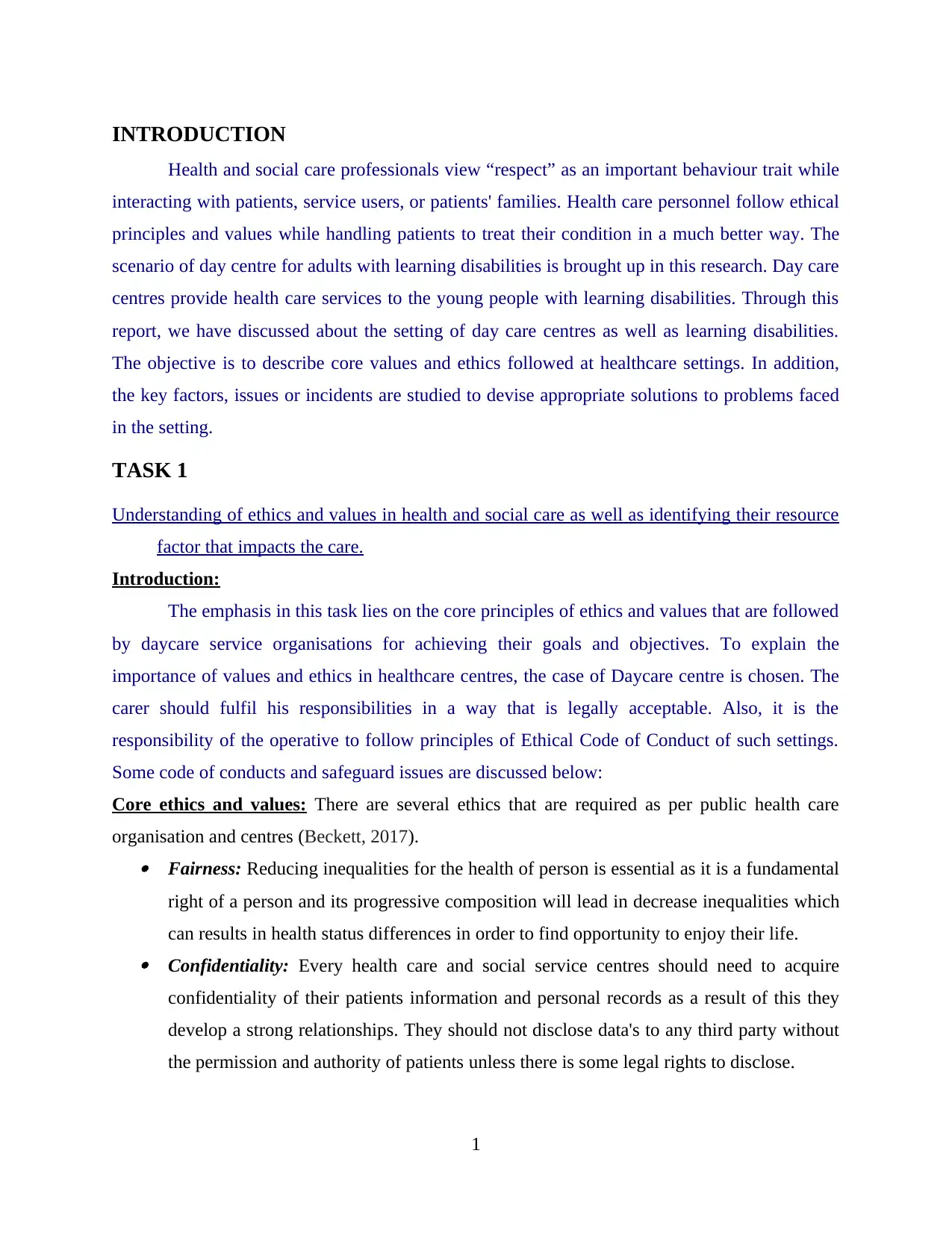
INTRODUCTION
Health and social care professionals view “respect” as an important behaviour trait while
interacting with patients, service users, or patients' families. Health care personnel follow ethical
principles and values while handling patients to treat their condition in a much better way. The
scenario of day centre for adults with learning disabilities is brought up in this research. Day care
centres provide health care services to the young people with learning disabilities. Through this
report, we have discussed about the setting of day care centres as well as learning disabilities.
The objective is to describe core values and ethics followed at healthcare settings. In addition,
the key factors, issues or incidents are studied to devise appropriate solutions to problems faced
in the setting.
TASK 1
Understanding of ethics and values in health and social care as well as identifying their resource
factor that impacts the care.
Introduction:
The emphasis in this task lies on the core principles of ethics and values that are followed
by daycare service organisations for achieving their goals and objectives. To explain the
importance of values and ethics in healthcare centres, the case of Daycare centre is chosen. The
carer should fulfil his responsibilities in a way that is legally acceptable. Also, it is the
responsibility of the operative to follow principles of Ethical Code of Conduct of such settings.
Some code of conducts and safeguard issues are discussed below:
Core ethics and values: There are several ethics that are required as per public health care
organisation and centres (Beckett, 2017). Fairness: Reducing inequalities for the health of person is essential as it is a fundamental
right of a person and its progressive composition will lead in decrease inequalities which
can results in health status differences in order to find opportunity to enjoy their life. Confidentiality: Every health care and social service centres should need to acquire
confidentiality of their patients information and personal records as a result of this they
develop a strong relationships. They should not disclose data's to any third party without
the permission and authority of patients unless there is some legal rights to disclose.
1
Health and social care professionals view “respect” as an important behaviour trait while
interacting with patients, service users, or patients' families. Health care personnel follow ethical
principles and values while handling patients to treat their condition in a much better way. The
scenario of day centre for adults with learning disabilities is brought up in this research. Day care
centres provide health care services to the young people with learning disabilities. Through this
report, we have discussed about the setting of day care centres as well as learning disabilities.
The objective is to describe core values and ethics followed at healthcare settings. In addition,
the key factors, issues or incidents are studied to devise appropriate solutions to problems faced
in the setting.
TASK 1
Understanding of ethics and values in health and social care as well as identifying their resource
factor that impacts the care.
Introduction:
The emphasis in this task lies on the core principles of ethics and values that are followed
by daycare service organisations for achieving their goals and objectives. To explain the
importance of values and ethics in healthcare centres, the case of Daycare centre is chosen. The
carer should fulfil his responsibilities in a way that is legally acceptable. Also, it is the
responsibility of the operative to follow principles of Ethical Code of Conduct of such settings.
Some code of conducts and safeguard issues are discussed below:
Core ethics and values: There are several ethics that are required as per public health care
organisation and centres (Beckett, 2017). Fairness: Reducing inequalities for the health of person is essential as it is a fundamental
right of a person and its progressive composition will lead in decrease inequalities which
can results in health status differences in order to find opportunity to enjoy their life. Confidentiality: Every health care and social service centres should need to acquire
confidentiality of their patients information and personal records as a result of this they
develop a strong relationships. They should not disclose data's to any third party without
the permission and authority of patients unless there is some legal rights to disclose.
1
⊘ This is a preview!⊘
Do you want full access?
Subscribe today to unlock all pages.

Trusted by 1+ million students worldwide
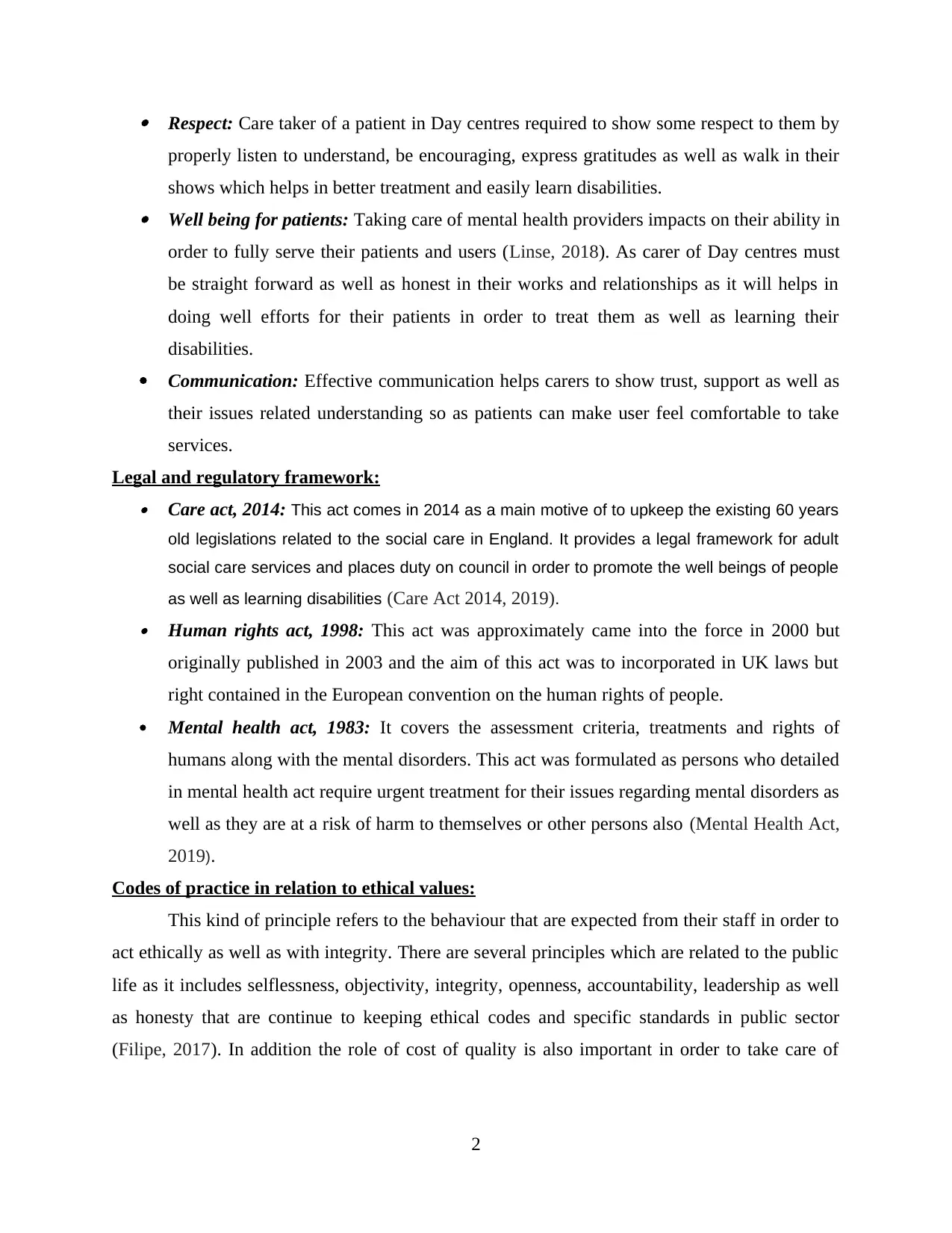
Respect: Care taker of a patient in Day centres required to show some respect to them by
properly listen to understand, be encouraging, express gratitudes as well as walk in their
shows which helps in better treatment and easily learn disabilities. Well being for patients: Taking care of mental health providers impacts on their ability in
order to fully serve their patients and users (Linse, 2018). As carer of Day centres must
be straight forward as well as honest in their works and relationships as it will helps in
doing well efforts for their patients in order to treat them as well as learning their
disabilities.
Communication: Effective communication helps carers to show trust, support as well as
their issues related understanding so as patients can make user feel comfortable to take
services.
Legal and regulatory framework: Care act, 2014: This act comes in 2014 as a main motive of to upkeep the existing 60 years
old legislations related to the social care in England. It provides a legal framework for adult
social care services and places duty on council in order to promote the well beings of people
as well as learning disabilities (Care Act 2014, 2019). Human rights act, 1998: This act was approximately came into the force in 2000 but
originally published in 2003 and the aim of this act was to incorporated in UK laws but
right contained in the European convention on the human rights of people.
Mental health act, 1983: It covers the assessment criteria, treatments and rights of
humans along with the mental disorders. This act was formulated as persons who detailed
in mental health act require urgent treatment for their issues regarding mental disorders as
well as they are at a risk of harm to themselves or other persons also (Mental Health Act,
2019).
Codes of practice in relation to ethical values:
This kind of principle refers to the behaviour that are expected from their staff in order to
act ethically as well as with integrity. There are several principles which are related to the public
life as it includes selflessness, objectivity, integrity, openness, accountability, leadership as well
as honesty that are continue to keeping ethical codes and specific standards in public sector
(Filipe, 2017). In addition the role of cost of quality is also important in order to take care of
2
properly listen to understand, be encouraging, express gratitudes as well as walk in their
shows which helps in better treatment and easily learn disabilities. Well being for patients: Taking care of mental health providers impacts on their ability in
order to fully serve their patients and users (Linse, 2018). As carer of Day centres must
be straight forward as well as honest in their works and relationships as it will helps in
doing well efforts for their patients in order to treat them as well as learning their
disabilities.
Communication: Effective communication helps carers to show trust, support as well as
their issues related understanding so as patients can make user feel comfortable to take
services.
Legal and regulatory framework: Care act, 2014: This act comes in 2014 as a main motive of to upkeep the existing 60 years
old legislations related to the social care in England. It provides a legal framework for adult
social care services and places duty on council in order to promote the well beings of people
as well as learning disabilities (Care Act 2014, 2019). Human rights act, 1998: This act was approximately came into the force in 2000 but
originally published in 2003 and the aim of this act was to incorporated in UK laws but
right contained in the European convention on the human rights of people.
Mental health act, 1983: It covers the assessment criteria, treatments and rights of
humans along with the mental disorders. This act was formulated as persons who detailed
in mental health act require urgent treatment for their issues regarding mental disorders as
well as they are at a risk of harm to themselves or other persons also (Mental Health Act,
2019).
Codes of practice in relation to ethical values:
This kind of principle refers to the behaviour that are expected from their staff in order to
act ethically as well as with integrity. There are several principles which are related to the public
life as it includes selflessness, objectivity, integrity, openness, accountability, leadership as well
as honesty that are continue to keeping ethical codes and specific standards in public sector
(Filipe, 2017). In addition the role of cost of quality is also important in order to take care of
2
Paraphrase This Document
Need a fresh take? Get an instant paraphrase of this document with our AI Paraphraser
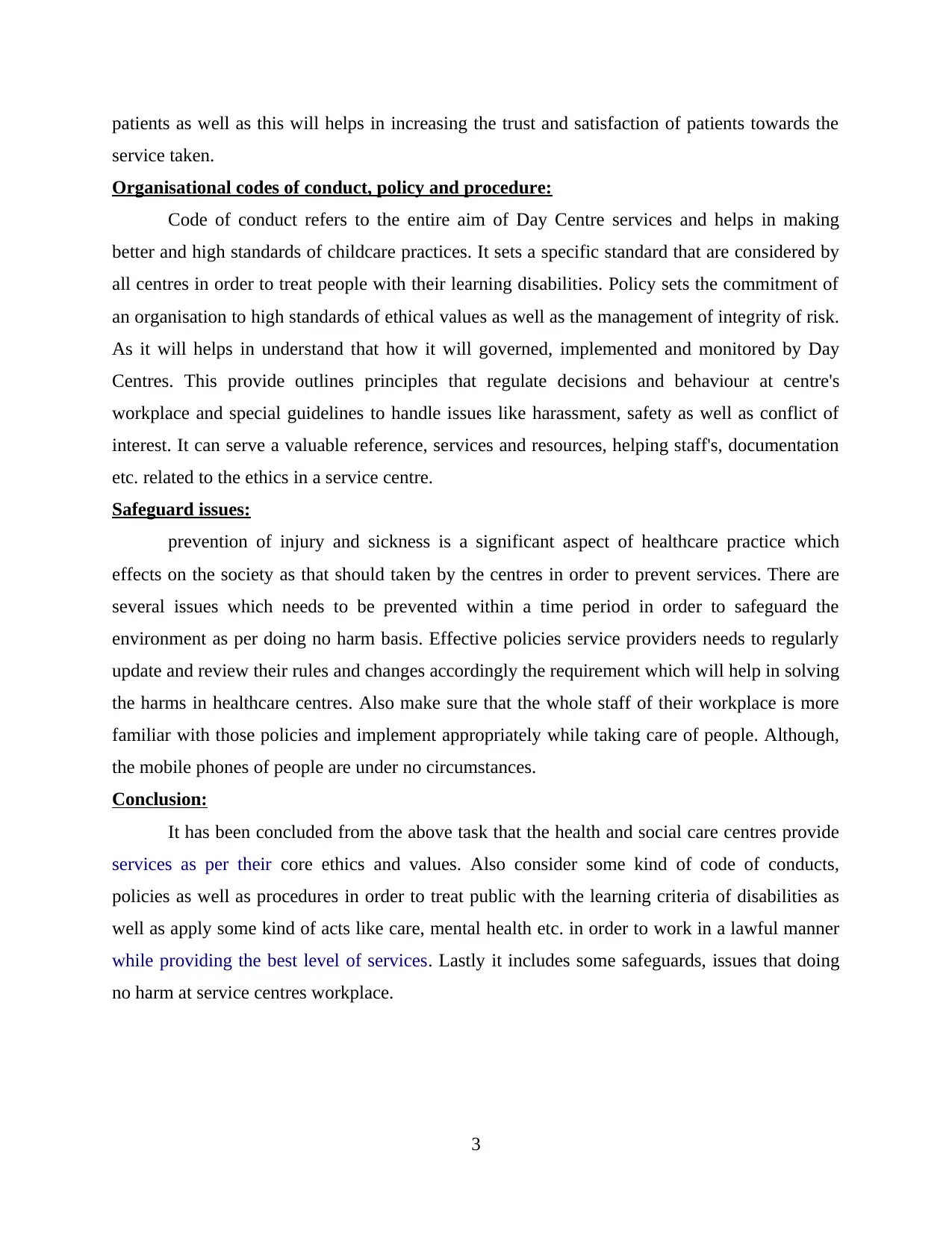
patients as well as this will helps in increasing the trust and satisfaction of patients towards the
service taken.
Organisational codes of conduct, policy and procedure:
Code of conduct refers to the entire aim of Day Centre services and helps in making
better and high standards of childcare practices. It sets a specific standard that are considered by
all centres in order to treat people with their learning disabilities. Policy sets the commitment of
an organisation to high standards of ethical values as well as the management of integrity of risk.
As it will helps in understand that how it will governed, implemented and monitored by Day
Centres. This provide outlines principles that regulate decisions and behaviour at centre's
workplace and special guidelines to handle issues like harassment, safety as well as conflict of
interest. It can serve a valuable reference, services and resources, helping staff's, documentation
etc. related to the ethics in a service centre.
Safeguard issues:
prevention of injury and sickness is a significant aspect of healthcare practice which
effects on the society as that should taken by the centres in order to prevent services. There are
several issues which needs to be prevented within a time period in order to safeguard the
environment as per doing no harm basis. Effective policies service providers needs to regularly
update and review their rules and changes accordingly the requirement which will help in solving
the harms in healthcare centres. Also make sure that the whole staff of their workplace is more
familiar with those policies and implement appropriately while taking care of people. Although,
the mobile phones of people are under no circumstances.
Conclusion:
It has been concluded from the above task that the health and social care centres provide
services as per their core ethics and values. Also consider some kind of code of conducts,
policies as well as procedures in order to treat public with the learning criteria of disabilities as
well as apply some kind of acts like care, mental health etc. in order to work in a lawful manner
while providing the best level of services. Lastly it includes some safeguards, issues that doing
no harm at service centres workplace.
3
service taken.
Organisational codes of conduct, policy and procedure:
Code of conduct refers to the entire aim of Day Centre services and helps in making
better and high standards of childcare practices. It sets a specific standard that are considered by
all centres in order to treat people with their learning disabilities. Policy sets the commitment of
an organisation to high standards of ethical values as well as the management of integrity of risk.
As it will helps in understand that how it will governed, implemented and monitored by Day
Centres. This provide outlines principles that regulate decisions and behaviour at centre's
workplace and special guidelines to handle issues like harassment, safety as well as conflict of
interest. It can serve a valuable reference, services and resources, helping staff's, documentation
etc. related to the ethics in a service centre.
Safeguard issues:
prevention of injury and sickness is a significant aspect of healthcare practice which
effects on the society as that should taken by the centres in order to prevent services. There are
several issues which needs to be prevented within a time period in order to safeguard the
environment as per doing no harm basis. Effective policies service providers needs to regularly
update and review their rules and changes accordingly the requirement which will help in solving
the harms in healthcare centres. Also make sure that the whole staff of their workplace is more
familiar with those policies and implement appropriately while taking care of people. Although,
the mobile phones of people are under no circumstances.
Conclusion:
It has been concluded from the above task that the health and social care centres provide
services as per their core ethics and values. Also consider some kind of code of conducts,
policies as well as procedures in order to treat public with the learning criteria of disabilities as
well as apply some kind of acts like care, mental health etc. in order to work in a lawful manner
while providing the best level of services. Lastly it includes some safeguards, issues that doing
no harm at service centres workplace.
3
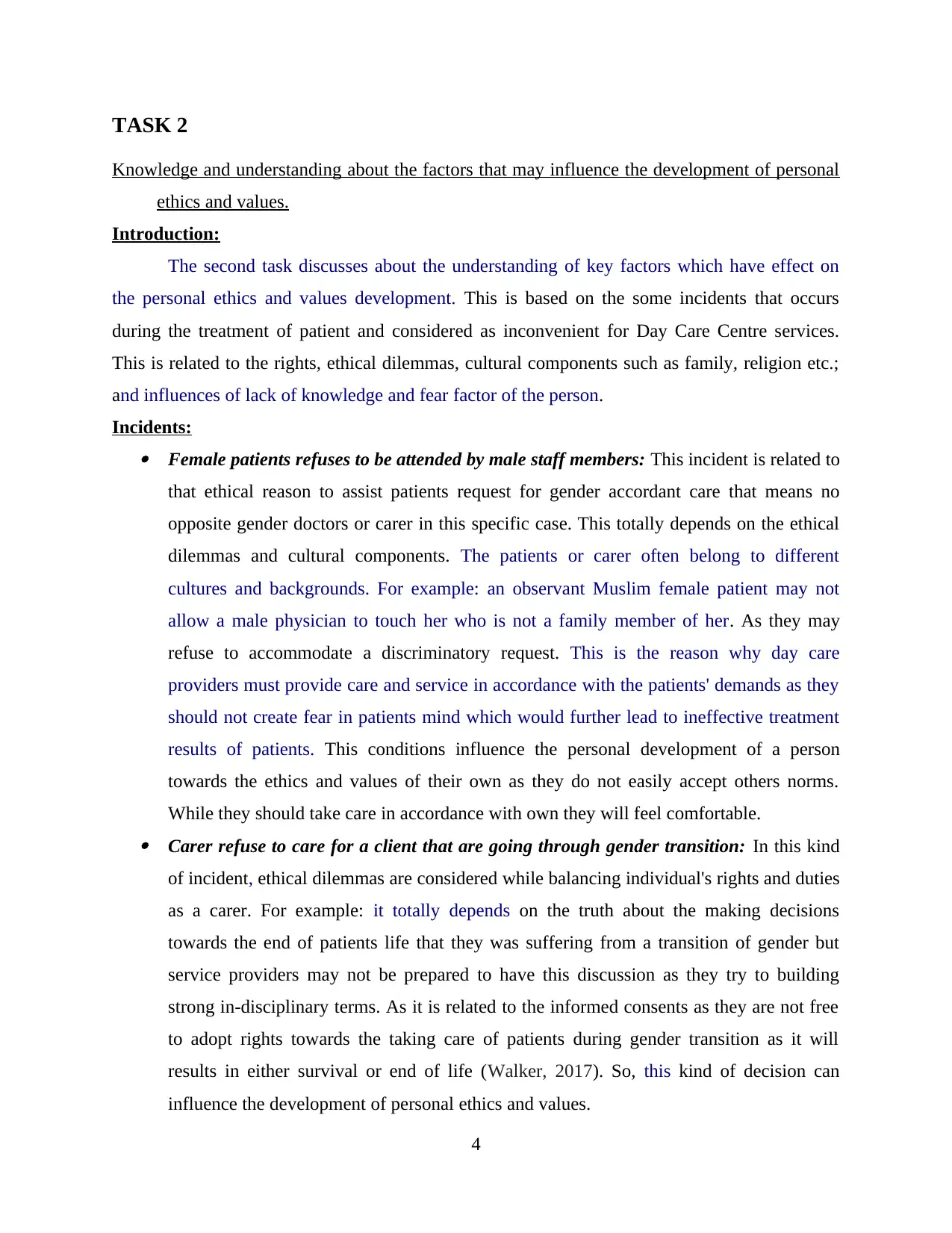
TASK 2
Knowledge and understanding about the factors that may influence the development of personal
ethics and values.
Introduction:
The second task discusses about the understanding of key factors which have effect on
the personal ethics and values development. This is based on the some incidents that occurs
during the treatment of patient and considered as inconvenient for Day Care Centre services.
This is related to the rights, ethical dilemmas, cultural components such as family, religion etc.;
and influences of lack of knowledge and fear factor of the person.
Incidents: Female patients refuses to be attended by male staff members: This incident is related to
that ethical reason to assist patients request for gender accordant care that means no
opposite gender doctors or carer in this specific case. This totally depends on the ethical
dilemmas and cultural components. The patients or carer often belong to different
cultures and backgrounds. For example: an observant Muslim female patient may not
allow a male physician to touch her who is not a family member of her. As they may
refuse to accommodate a discriminatory request. This is the reason why day care
providers must provide care and service in accordance with the patients' demands as they
should not create fear in patients mind which would further lead to ineffective treatment
results of patients. This conditions influence the personal development of a person
towards the ethics and values of their own as they do not easily accept others norms.
While they should take care in accordance with own they will feel comfortable. Carer refuse to care for a client that are going through gender transition: In this kind
of incident, ethical dilemmas are considered while balancing individual's rights and duties
as a carer. For example: it totally depends on the truth about the making decisions
towards the end of patients life that they was suffering from a transition of gender but
service providers may not be prepared to have this discussion as they try to building
strong in-disciplinary terms. As it is related to the informed consents as they are not free
to adopt rights towards the taking care of patients during gender transition as it will
results in either survival or end of life (Walker, 2017). So, this kind of decision can
influence the development of personal ethics and values.
4
Knowledge and understanding about the factors that may influence the development of personal
ethics and values.
Introduction:
The second task discusses about the understanding of key factors which have effect on
the personal ethics and values development. This is based on the some incidents that occurs
during the treatment of patient and considered as inconvenient for Day Care Centre services.
This is related to the rights, ethical dilemmas, cultural components such as family, religion etc.;
and influences of lack of knowledge and fear factor of the person.
Incidents: Female patients refuses to be attended by male staff members: This incident is related to
that ethical reason to assist patients request for gender accordant care that means no
opposite gender doctors or carer in this specific case. This totally depends on the ethical
dilemmas and cultural components. The patients or carer often belong to different
cultures and backgrounds. For example: an observant Muslim female patient may not
allow a male physician to touch her who is not a family member of her. As they may
refuse to accommodate a discriminatory request. This is the reason why day care
providers must provide care and service in accordance with the patients' demands as they
should not create fear in patients mind which would further lead to ineffective treatment
results of patients. This conditions influence the personal development of a person
towards the ethics and values of their own as they do not easily accept others norms.
While they should take care in accordance with own they will feel comfortable. Carer refuse to care for a client that are going through gender transition: In this kind
of incident, ethical dilemmas are considered while balancing individual's rights and duties
as a carer. For example: it totally depends on the truth about the making decisions
towards the end of patients life that they was suffering from a transition of gender but
service providers may not be prepared to have this discussion as they try to building
strong in-disciplinary terms. As it is related to the informed consents as they are not free
to adopt rights towards the taking care of patients during gender transition as it will
results in either survival or end of life (Walker, 2017). So, this kind of decision can
influence the development of personal ethics and values.
4
⊘ This is a preview!⊘
Do you want full access?
Subscribe today to unlock all pages.

Trusted by 1+ million students worldwide
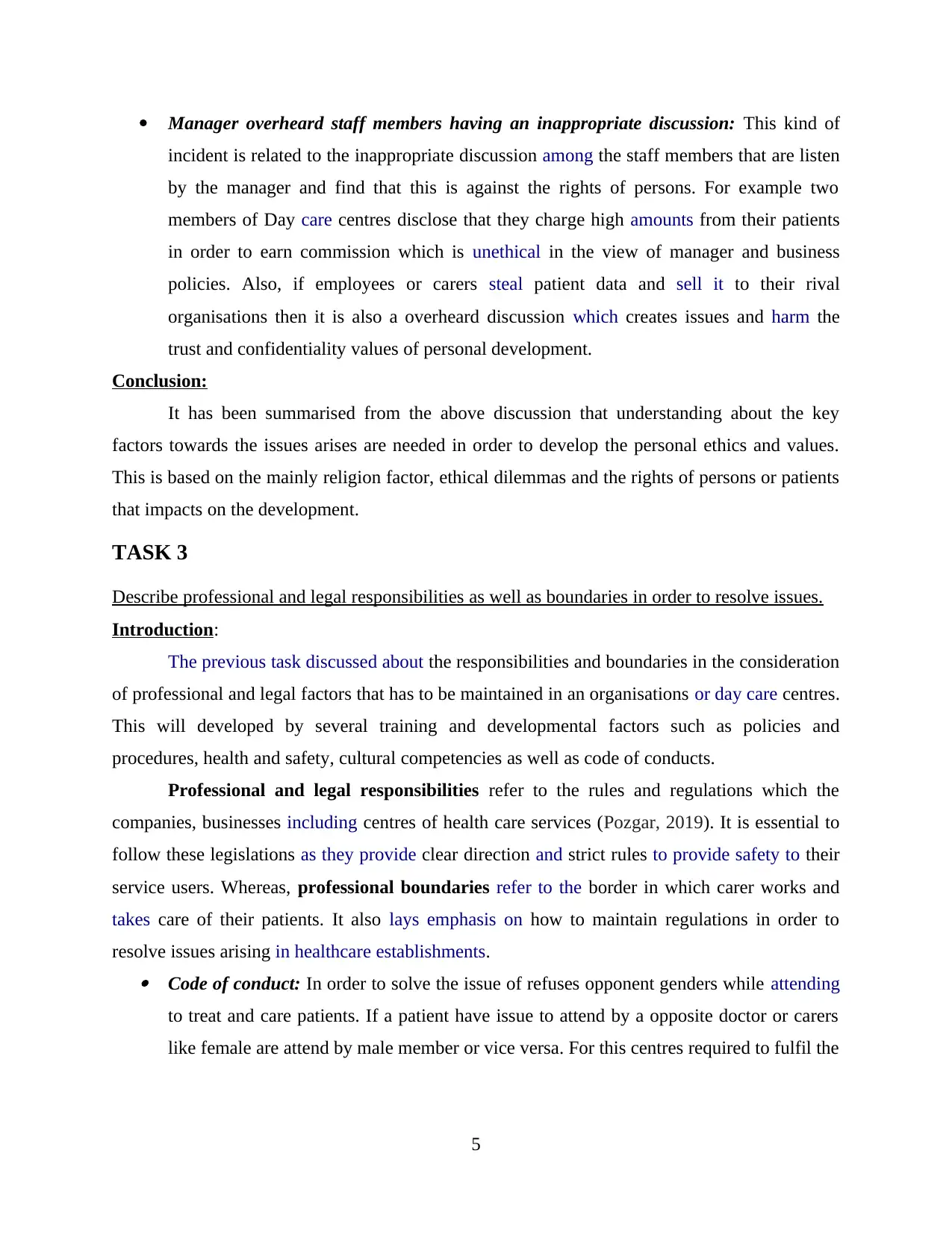
Manager overheard staff members having an inappropriate discussion: This kind of
incident is related to the inappropriate discussion among the staff members that are listen
by the manager and find that this is against the rights of persons. For example two
members of Day care centres disclose that they charge high amounts from their patients
in order to earn commission which is unethical in the view of manager and business
policies. Also, if employees or carers steal patient data and sell it to their rival
organisations then it is also a overheard discussion which creates issues and harm the
trust and confidentiality values of personal development.
Conclusion:
It has been summarised from the above discussion that understanding about the key
factors towards the issues arises are needed in order to develop the personal ethics and values.
This is based on the mainly religion factor, ethical dilemmas and the rights of persons or patients
that impacts on the development.
TASK 3
Describe professional and legal responsibilities as well as boundaries in order to resolve issues.
Introduction:
The previous task discussed about the responsibilities and boundaries in the consideration
of professional and legal factors that has to be maintained in an organisations or day care centres.
This will developed by several training and developmental factors such as policies and
procedures, health and safety, cultural competencies as well as code of conducts.
Professional and legal responsibilities refer to the rules and regulations which the
companies, businesses including centres of health care services (Pozgar, 2019). It is essential to
follow these legislations as they provide clear direction and strict rules to provide safety to their
service users. Whereas, professional boundaries refer to the border in which carer works and
takes care of their patients. It also lays emphasis on how to maintain regulations in order to
resolve issues arising in healthcare establishments. Code of conduct: In order to solve the issue of refuses opponent genders while attending
to treat and care patients. If a patient have issue to attend by a opposite doctor or carers
like female are attend by male member or vice versa. For this centres required to fulfil the
5
incident is related to the inappropriate discussion among the staff members that are listen
by the manager and find that this is against the rights of persons. For example two
members of Day care centres disclose that they charge high amounts from their patients
in order to earn commission which is unethical in the view of manager and business
policies. Also, if employees or carers steal patient data and sell it to their rival
organisations then it is also a overheard discussion which creates issues and harm the
trust and confidentiality values of personal development.
Conclusion:
It has been summarised from the above discussion that understanding about the key
factors towards the issues arises are needed in order to develop the personal ethics and values.
This is based on the mainly religion factor, ethical dilemmas and the rights of persons or patients
that impacts on the development.
TASK 3
Describe professional and legal responsibilities as well as boundaries in order to resolve issues.
Introduction:
The previous task discussed about the responsibilities and boundaries in the consideration
of professional and legal factors that has to be maintained in an organisations or day care centres.
This will developed by several training and developmental factors such as policies and
procedures, health and safety, cultural competencies as well as code of conducts.
Professional and legal responsibilities refer to the rules and regulations which the
companies, businesses including centres of health care services (Pozgar, 2019). It is essential to
follow these legislations as they provide clear direction and strict rules to provide safety to their
service users. Whereas, professional boundaries refer to the border in which carer works and
takes care of their patients. It also lays emphasis on how to maintain regulations in order to
resolve issues arising in healthcare establishments. Code of conduct: In order to solve the issue of refuses opponent genders while attending
to treat and care patients. If a patient have issue to attend by a opposite doctor or carers
like female are attend by male member or vice versa. For this centres required to fulfil the
5
Paraphrase This Document
Need a fresh take? Get an instant paraphrase of this document with our AI Paraphraser
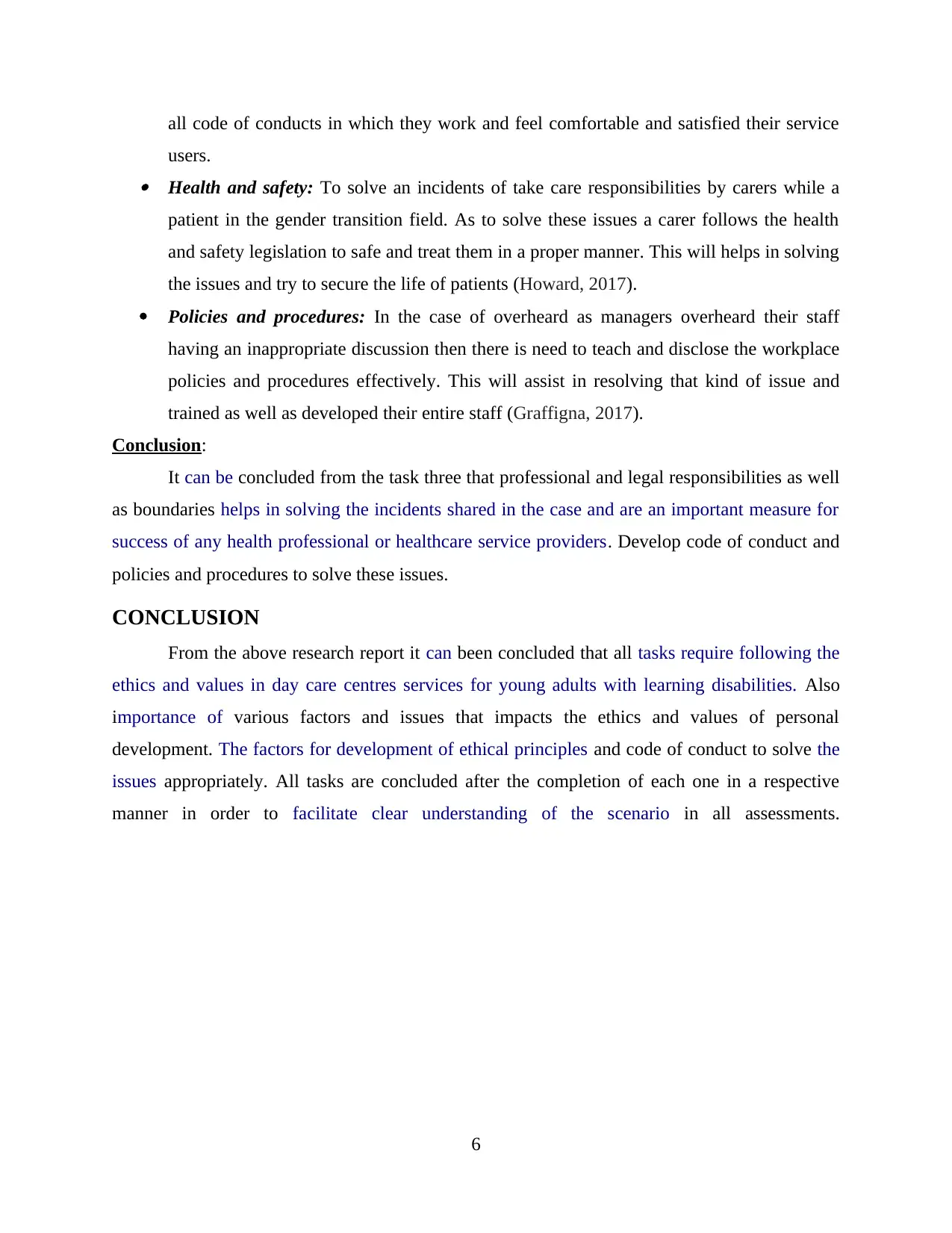
all code of conducts in which they work and feel comfortable and satisfied their service
users. Health and safety: To solve an incidents of take care responsibilities by carers while a
patient in the gender transition field. As to solve these issues a carer follows the health
and safety legislation to safe and treat them in a proper manner. This will helps in solving
the issues and try to secure the life of patients (Howard, 2017).
Policies and procedures: In the case of overheard as managers overheard their staff
having an inappropriate discussion then there is need to teach and disclose the workplace
policies and procedures effectively. This will assist in resolving that kind of issue and
trained as well as developed their entire staff (Graffigna, 2017).
Conclusion:
It can be concluded from the task three that professional and legal responsibilities as well
as boundaries helps in solving the incidents shared in the case and are an important measure for
success of any health professional or healthcare service providers. Develop code of conduct and
policies and procedures to solve these issues.
CONCLUSION
From the above research report it can been concluded that all tasks require following the
ethics and values in day care centres services for young adults with learning disabilities. Also
importance of various factors and issues that impacts the ethics and values of personal
development. The factors for development of ethical principles and code of conduct to solve the
issues appropriately. All tasks are concluded after the completion of each one in a respective
manner in order to facilitate clear understanding of the scenario in all assessments.
6
users. Health and safety: To solve an incidents of take care responsibilities by carers while a
patient in the gender transition field. As to solve these issues a carer follows the health
and safety legislation to safe and treat them in a proper manner. This will helps in solving
the issues and try to secure the life of patients (Howard, 2017).
Policies and procedures: In the case of overheard as managers overheard their staff
having an inappropriate discussion then there is need to teach and disclose the workplace
policies and procedures effectively. This will assist in resolving that kind of issue and
trained as well as developed their entire staff (Graffigna, 2017).
Conclusion:
It can be concluded from the task three that professional and legal responsibilities as well
as boundaries helps in solving the incidents shared in the case and are an important measure for
success of any health professional or healthcare service providers. Develop code of conduct and
policies and procedures to solve these issues.
CONCLUSION
From the above research report it can been concluded that all tasks require following the
ethics and values in day care centres services for young adults with learning disabilities. Also
importance of various factors and issues that impacts the ethics and values of personal
development. The factors for development of ethical principles and code of conduct to solve the
issues appropriately. All tasks are concluded after the completion of each one in a respective
manner in order to facilitate clear understanding of the scenario in all assessments.
6
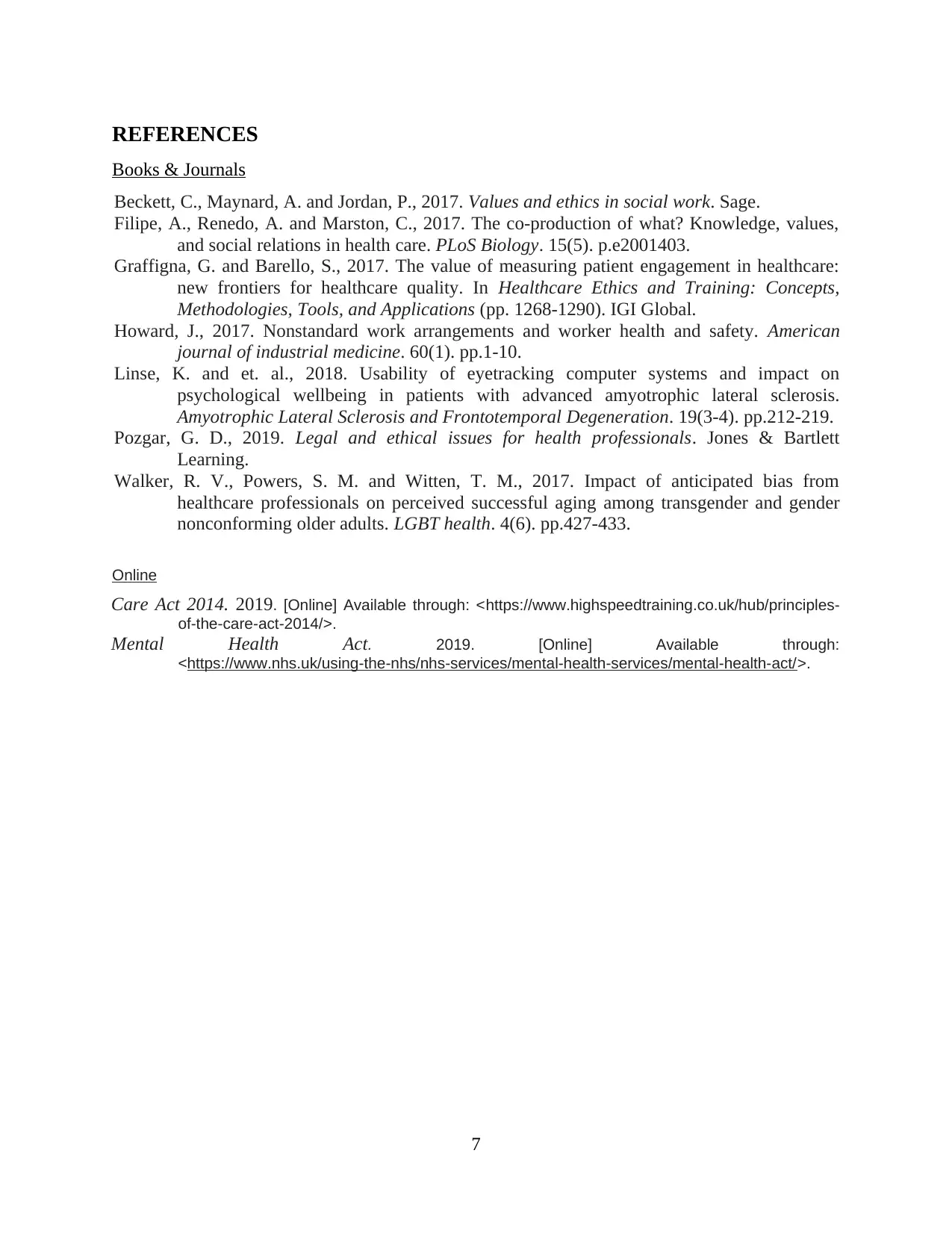
REFERENCES
Books & Journals
Beckett, C., Maynard, A. and Jordan, P., 2017. Values and ethics in social work. Sage.
Filipe, A., Renedo, A. and Marston, C., 2017. The co-production of what? Knowledge, values,
and social relations in health care. PLoS Biology. 15(5). p.e2001403.
Graffigna, G. and Barello, S., 2017. The value of measuring patient engagement in healthcare:
new frontiers for healthcare quality. In Healthcare Ethics and Training: Concepts,
Methodologies, Tools, and Applications (pp. 1268-1290). IGI Global.
Howard, J., 2017. Nonstandard work arrangements and worker health and safety. American
journal of industrial medicine. 60(1). pp.1-10.
Linse, K. and et. al., 2018. Usability of eyetracking computer systems and impact on
psychological wellbeing in patients with advanced amyotrophic lateral sclerosis.
Amyotrophic Lateral Sclerosis and Frontotemporal Degeneration. 19(3-4). pp.212-219.
Pozgar, G. D., 2019. Legal and ethical issues for health professionals. Jones & Bartlett
Learning.
Walker, R. V., Powers, S. M. and Witten, T. M., 2017. Impact of anticipated bias from
healthcare professionals on perceived successful aging among transgender and gender
nonconforming older adults. LGBT health. 4(6). pp.427-433.
Online
Care Act 2014. 2019. [Online] Available through: <https://www.highspeedtraining.co.uk/hub/principles-
of-the-care-act-2014/>.
Mental Health Act. 2019. [Online] Available through:
<https://www.nhs.uk/using-the-nhs/nhs-services/mental-health-services/mental-health-act/>.
7
Books & Journals
Beckett, C., Maynard, A. and Jordan, P., 2017. Values and ethics in social work. Sage.
Filipe, A., Renedo, A. and Marston, C., 2017. The co-production of what? Knowledge, values,
and social relations in health care. PLoS Biology. 15(5). p.e2001403.
Graffigna, G. and Barello, S., 2017. The value of measuring patient engagement in healthcare:
new frontiers for healthcare quality. In Healthcare Ethics and Training: Concepts,
Methodologies, Tools, and Applications (pp. 1268-1290). IGI Global.
Howard, J., 2017. Nonstandard work arrangements and worker health and safety. American
journal of industrial medicine. 60(1). pp.1-10.
Linse, K. and et. al., 2018. Usability of eyetracking computer systems and impact on
psychological wellbeing in patients with advanced amyotrophic lateral sclerosis.
Amyotrophic Lateral Sclerosis and Frontotemporal Degeneration. 19(3-4). pp.212-219.
Pozgar, G. D., 2019. Legal and ethical issues for health professionals. Jones & Bartlett
Learning.
Walker, R. V., Powers, S. M. and Witten, T. M., 2017. Impact of anticipated bias from
healthcare professionals on perceived successful aging among transgender and gender
nonconforming older adults. LGBT health. 4(6). pp.427-433.
Online
Care Act 2014. 2019. [Online] Available through: <https://www.highspeedtraining.co.uk/hub/principles-
of-the-care-act-2014/>.
Mental Health Act. 2019. [Online] Available through:
<https://www.nhs.uk/using-the-nhs/nhs-services/mental-health-services/mental-health-act/>.
7
⊘ This is a preview!⊘
Do you want full access?
Subscribe today to unlock all pages.

Trusted by 1+ million students worldwide
1 out of 9
Related Documents
Your All-in-One AI-Powered Toolkit for Academic Success.
+13062052269
info@desklib.com
Available 24*7 on WhatsApp / Email
![[object Object]](/_next/static/media/star-bottom.7253800d.svg)
Unlock your academic potential
Copyright © 2020–2026 A2Z Services. All Rights Reserved. Developed and managed by ZUCOL.




